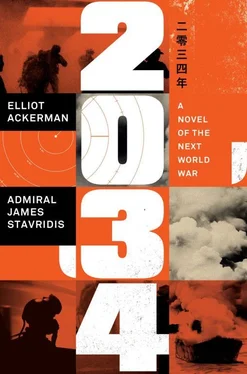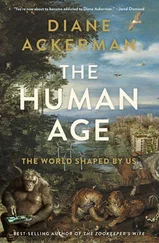Finally, they arrived at their destination, which wasn’t a step forward but rather a step backward in time: the Delhi Gymkhana, his uncle’s club. A long, straight driveway led to its canopied entrance, while on the left and right teams of mowers kept the vast lawns perfectly cropped. Off in the distance Chowdhury could make out the grass tennis courts and shimmer of turquoise water in the swimming pool. After his uncle exchanged pleasantries with the staff, who all greeted him with obsequious bows, they were led to the veranda, which looked out on the elaborate gardens, another legacy from the club’s founding at the height of the British Raj.
They ordered their drinks—gin and tonic for Patel, a club soda for Chowdhury, which evoked a disappointed sigh from the admiral. When the server left them, Patel asked, “How is my sister?” She was fine, Chowdhury answered. She enjoyed being a grandmother; his father’s death had been very hard on her—but then he cut himself off, feeling suddenly as if he didn’t quite possess the license to inform on his mother to her estranged brother. The conversation might have ended there were it not for a commotion inside the club, near the television above the bar. The well-turned-out patrons, most of whom wore tennis whites, along with the jacketed waiters and busboys, had gathered to listen to the news. The anchors were piecing together early reports of a massive naval engagement in the South China Sea, touching their earpieces and staring vacantly into the camera as some new fact trickled across the wire, all of which built to a single, astounding conclusion: the United States Navy had been soundly defeated.
Only Chowdhury and his uncle didn’t feel the need to crowd around the television. They took the opportunity to sit, alone, on the now-empty veranda. “It will take people a while to understand what this all means,” Patel said to his nephew as he nodded toward the bar.
“We’re at war; that’s what it means.”
Patel nodded. He took a sip of his gin and tonic. “Yes,” he said, “but your country’s defeat is just beginning. That’s also what this means.”
“Our navy is as capable as theirs, even more so,” Chowdhury replied defensively. “Sure, we underestimated them, but it’s a mistake we won’t make again. If anything, they’re the ones who’ve made the mistake.” Chowdhury paused and changed the inflection of his voice. “I fear all we have done is to awaken a sleeping giant and fill him with a terrible resolve.”
His uncle knew the quote. “Admiral Isoroku Yamamoto,” replied Patel. “But this isn’t Pearl Harbor. This is a very different situation. Look around you. Look at this club. When empires overreach, that’s when they crumble. This club, with its fusty Britishness, is a monument to overreach.”
Chowdhury reminded his uncle that his country had far from overreached; that it had suffered a single defeat, perhaps two if you counted the “ambush of our flotilla,” as Chowdhury referred to what had happened to the John Paul Jones and its sister ships. “Also,” he added, allowing his voice to enter a graver register, “we haven’t even discussed our country’s tactical and strategic nuclear capability.”
The old admiral crossed his arms over his chest. “Listen to yourself. Tactical and strategic nukes. Do you hear what you’re saying? With those weapons, no one wins.”
Chowdhury glanced away, and then, speaking under his breath like a petulant teenager, he muttered, “Hiroshima… Nagasaki… we won that.”
“ We ? Who is this we ?” His uncle was becoming increasingly annoyed. “Your family lived not three miles from here in those days. And why do you think America prospered after the Second World War?”
“Because we won ,” answered Chowdhury.
Patel shook his head. “The British won too; so did the Soviets, and even the French.”
“I don’t see what you’re getting at.”
“In war, it’s not that you win. It’s how you win. America didn’t used to start wars. It used to finish them. But now”—Patel dropped his chin to his chest and began to shake his head mournfully—“now it is the reverse; now you start wars and don’t finish them.” Then he switched the subject and began to ask again about his sister. Chowdhury showed him a photograph of his daughter; he spoke a bit more about his divorce, his mother’s antipathy toward his wife—the Ellen DeGeneres clone, as his mother called her, though Patel didn’t get the reference. After listening to his nephew, his only response was a question: “Would you ever consider returning home?”
“America is my home,” answered Chowdhury. “Nowhere else on earth could I, the son of an immigrant, rise up to work in the White House. America is special. That’s what I’ve been trying to tell you.”
Patel sat, respectfully listening to his nephew. “Do you know what I most enjoy about belonging to this club?” he asked.
Chowdhury returned a vacant gaze.
“Come,” said Patel, pushing back his chair, its legs stuttering across the tiled floor of the veranda. They stepped into a room immediately inside, which appeared to be a trophy room, the walls lined with glass-fronted cabinets that contained resplendent two-handled cups engraved with years that reached back into other centuries. Patel took Chowdhury to a framed photograph in the far corner. Three ranks of British army officers stood flanked by their turbaned sepoys. The date was nearly one hundred years ago, a decade before Indian independence. Patel explained that the photograph was of the Rajputana Rifles, whose British officers were members of this club, and that it was taken on the eve of the Second World War, before the regiment shipped out for the Pacific theatre.
“Most of the officers were killed in either Burma or Malaya,” said Patel. Their sepia-toned expressions stared hauntingly back at Chowdhury. Then his uncle took a silver pen from his pocket, which he indexed on one face, that of a mustachioed orderly with a squat build and single chevron, who scowled at the camera. “Him, right there. You see the name?” Patel tapped his pen on the bottom of the photograph, where there was a roster. “Lance Naik Imran Sandeep Patel… your great-great-grandfather.”
Chowdhury stood silently in front of the photograph.
“It isn’t only in America where people can change their fortunes,” his uncle said. “America is not so special.”
Chowdhury removed his phone from his pocket and snapped a photograph of his ancestor’s face. “How do you think your government will respond?” he asked, gesturing toward the television and the breaking news about what seemed to be the certainty of an impending war.
“It’s difficult to say,” his uncle told him. “But I believe we’ll make out very well.”
“Why do you say that?”
“Because we have learned the lessons that you have forgotten.”

11:42 May 13, 2034 (GMT+9)
Yokosuka Naval Base
First it was her flight home that was canceled.
Then her orders.
A medical evaluation was scheduled for her at the naval hospital.
This time she passed it.
A below-the-zone promotion came next, to rear admiral (lower half)—a one-star. A new set of orders followed. The assignment shocked her. The Navy was giving her command of the Enterprise Strike Group, which included the carrier itself as well as nearly twenty other ships. This all took a week. In another week she’d meet the flotilla at Yokosuka. The night before the Enterprise arrived, Hunt had the first of the nightmares that would come to plague her.
Читать дальше













